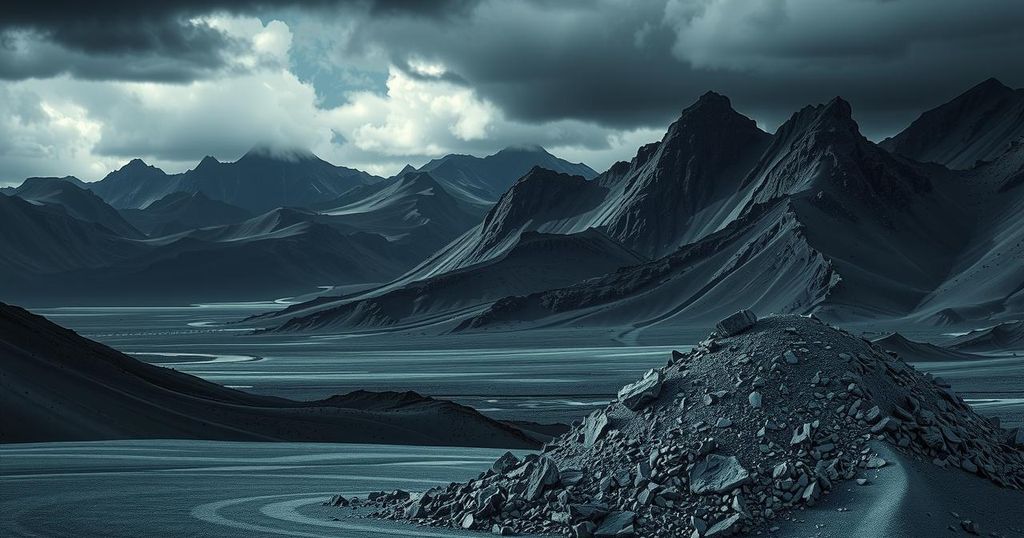Violence has escalated in the DRC as the rebel group M23 claims control of Goma, prompting government backlash and international concern. Humanitarian conditions worsen, with reports of civilian casualties and unrest in response to Rwanda’s alleged support for the rebels. Key strategic control over valuable resources is central to the conflict, leading to a pressing need for diplomatic intervention.
The Democratic Republic of Congo (DRC) is witnessing a surge in violence as a rebel coalition, the Alliance Fleuve Congo (AFC), lays claim to Goma, a pivotal city in the mineral-rich eastern region of the country. This claim follows their recent capture of nearby towns and is met with opposition from government forces supported by international peacekeepers. The situation threatens to exacerbate an ongoing humanitarian crisis in a region rich in valuable resources like coltan, essential for modern electronics.
In a statement, AFC spokesperson Victor Tesongo confirmed that “AFC-M23 controls Goma,” indicating that the city fell under pressure from the rebels. The DRC government has acknowledged the rebels’ presence but has not yet validated their takeover. Consequently, the government severed diplomatic ties with Rwanda, suspecting it of providing support to the M23 group. As the conflict escalates, many locals are fleeing Goma, placing further strain on humanitarian agencies.
Recent developments highlight a significant toll on peacekeeping forces, with multiple casualties among South African soldiers deployed in the DRC. Hospitals in Goma are overwhelmed with casualties from the fighting, and reports of violence against civilians are emerging. International protests occur in Kinshasa against Rwanda, as tensions between DRC and its neighbor increase.
The M23, which has a history of armed rebellion, claims to protect the interests of marginalized Rwandophone communities. However, their attempt to control Goma reflects a broader territorial ambition. The M23 asserts a humanitarian motive, stating it seeks to “liberate” the residents; yet analysts point towards the strategic significance of Goma amidst ongoing resource exploitation.
The DRC has grappled with militia violence for decades, primarily driven by competition over mineral resources. The UN has noted that M23’s control over Rubaya, a significant coltan mining town, significantly boosts their financial resources. Reports indicate illicit trade routes connected to Rwanda, raising international concern about regional dynamics.
M23’s recent actions in Goma have triggered fears of a larger conflict involving Rwanda, with both countries exchanging fire along their border. As military tensions rise, Rwanda publicly defends its actions as necessary for national security. The UN has been called to address the deteriorating situation, but previous peace attempts have met with limited success
Eastern African leaders are set to meet to discuss potential resolutions to the crisis. There remains skepticism regarding the efficacy of proposed solutions, as any lasting peace must address underlying security and economic control issues in the region. The need for an effective strategy to deal with both the humanitarian crisis and the ongoing violence is urgent for all parties involved.
The situation in the DRC has deteriorated significantly due to the resurgence of the M23 rebel group, which has capitalized on longstanding grievances among Rwandophone communities and historical tensions with neighboring Rwanda. Resource competition, notably over valuable minerals like coltan, has further intensified conflicts in the region, leading to a complex web of violence involving various militia groups and governmental forces. Goma serves as a crucial hub for these dynamics, influencing humanitarian conditions and geopolitical relations in East Africa.
The conflict in the DRC, particularly the current crisis surrounding Goma, underscores profound humanitarian concerns and the pressing need for effective conflict resolution. With ongoing military engagements and allegations of external support to rebel groups, international attention remains critical. A significant diplomatic effort is required to address the root causes of the violence and human suffering currently manifesting in the eastern DRC.
Original Source: www.cnn.com




